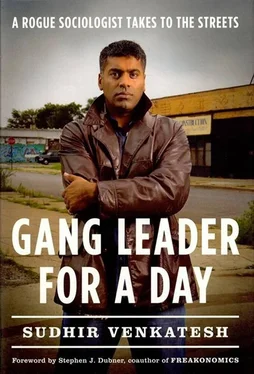“Look who’s here!” J.T. shouted. “The Professor. Welcome back.”
His hands were sticky with barbecue sauce, so he just nodded, then introduced me to everyone at the table. I said hi to his girlfriend, whom I knew as Missie, and the young son they had together, Jamel.
“Is this the young man you’ve been telling me about?” said an older woman, putting her arm on my shoulder.
“Yes, Mama,” J.T. said between bites, his voice as obedient as a young boy’s.
“Well, Mr. Professor, I’m J.T.’s mother.”
“They call her Ms. Mae,” J.T. said.
“That’s right,” she said. “And you can call me that, too.” She led me to another table and prepared a large plate of food for me. I told her I didn’t eat meat, so she loaded me up with spaghetti, mac and cheese, greens, and cornbread.
We sat around for a few hours while the kids played. I spoke mostly to J.T.’s mother, and we forged a bond immediately. Sensing my interests, she began talking about the challenges of raising a family in public housing. She pointed to different people at the barbecue and filled in their stories. Carla, the birthday girl, was a one-year-old whose father and mother were both in jail for selling drugs. The adults in her building had decided to raise the child. This meant hiding her from the Department of Child and Family Services, which would have sent Carla into foster care. Different families took turns keeping Carla, shifting her to a new apartment whenever they caught wind that the social workers were snooping around. Ms. Mae talked about how teenage girls shouldn’t have children so early, about the tragedy of kids getting caught up in violence, the value of an education, and her insistence that J.T. attend college.
J.T. came over to tell me about a big party the Black Kings were hosting later that afternoon. His gang had won a South Side basketball tournament, and everyone would be celebrating. He and I took a walk toward his building. Again I had so many questions: What did his mother think of the life he had chosen? How much did she even know? What did the typical Robert Taylor resident think about his organization?
Instead I asked a pretty tame one: “Why is everyone partying with you tonight? I thought you said it was a gang tournament.”
“See, around here each building has an organization,” he said.
“Organization,” I knew, was one of the words that gang members sometimes used to refer to the gang; other words were “set” and “folks.”
“And we don’t just fight each other. We have basketball tournaments, softball tournaments, card games. Sometimes it’s just people in the organization who play, but sometimes we find the best people in the building-like, we sometimes call Darryl, who used to play ball for Wisconsin, but he’s not in the organization. So it’s a building thing.”
“So people in your building actually root for you?” I was puzzled as to how non-gang members viewed the Black Kings.
“Yeah! I know you think this sounds funny, but it’s not like everyone hates us. You just have to see, it’s a community thing.”
He wasn’t kidding. The party was held in a courtyard surrounded by three buildings, and several hundred people showed up to eat, drink beer, and party to the music of a DJ. All expenses were paid by the Black Kings.
I stayed close to J.T., sitting on the hood of his car, taking in all the activity. I watched young black men drive up in expensive sports cars, trailed by posses and girlfriends. They all greeted J.T. and congratulated him on winning the tournament.
J.T. explained that it was courtesy for leaders of some of the losing gangs to drop by. “The ones that are shooting at us won’t come anywhere near us,” he said, “but sometimes you got other organizations that you don’t fight, that you just have a rivalry with.” He told me that the various gangs’ higher-ranking leaders tended to interact peacefully, since they often did business together-unlike the teenagers, or “shorties,” he said. “They mostly just beat the shit out of each other in high school or at parties.”
J.T. didn’t introduce me to many people who stopped by, and I didn’t feel comfortable leaving my spot. So I just sat and watched until the beers began making me drowsy. By dusk the party was dying down. That’s when J.T. had one of his “shorties” drive me back to my apartment.
After about a month of commuting to his building, I managed to convince J.T. that I didn’t need an escort to meet me at the bus stop. If the weather was okay, I’d even walk, which gave me a chance to see some of the neighborhoods that surrounded Robert Taylor. They were all poor, but even with their mixture of dilapidated homes and abandoned lots, not nearly as intimidating.
I always got nervous as I approached Robert Taylor, especially if J.T. wasn’t there to meet me. But by now I was known to the gang members stationed out front. So instead of searching me-which they often did to strangers, even if it was an ambulance driver or a utility worker-they let me go up to Ms. Mae’s apartment on the tenth floor. She’d fix me a plate of food, and then we would sit and talk.
I felt self-conscious that Ms. Mae had to entertain me while I waited for J.T. I also figured she couldn’t really afford to feed another mouth. I once tried to give her a few dollars for my meal. “Young man, don’t ever do that again,” she scolded, pushing the bills back at me. “Let me tell you something about us. We may be poor, but when you come over here, don’t pity us, don’t pardon us, and don’t hold us to a lower standard than you hold yourself up to.”
Ms. Mae was a heavyset woman in her late fifties who, unless she was off to church, always wore an apron. She always seemed to be in the middle of housework. Today’s apron was flowery, yellow and pink, with MS. MAE and GOD BLESS printed on it. She wore thick glasses and a warm, inviting look on her face. “You know, I came here with the clothes on my back,” she said. “Arkansas. Mother said there was no life for me down there no more. She said, ‘Go see your auntie in Chicago, get yourself a man and a job, and don’t turn around.’ And I didn’t. I raised six children in Chicago. Never looked back.”
I sat and ate as she spoke, trying to keep up with the stories she was telling as well as the food she kept heaping on my plate.
“We live in a community, understand? Not the projects-I hate that word. We live in a community. We need a helping hand now and then, but who doesn’t? Everyone in this building helps as much as they can. We share our food, just like I’m doing with you. My son says you’re writing about his life-well, you may want to write about this community, and how we help each other. And when I come over to your house, you’ll share with me. You’ll cook for me if I’m hungry. But when you’re here, you’re in my home and my community. And we’ll take care of you.”
I felt nervous as she spoke. Her warmth and her notion of community certainly challenged what I had read about Robert Taylor. Ms. Mae spoke to me as though she were teaching a child about life, not giving an academic researcher answers to scientific questions. Indeed, the time I was spending with families felt less and less like research. People who knew nothing about me nevertheless took me inside their world, talked to me with such openness, and offered me the food that they had probably budgeted for their own children.
No one back at the U of C had prepared me to feel such strong emotional connections to the people I studied. None of the ethnographicstudies I’d read offered much guidance about the relationships a researcher formed during fieldwork and how to manage them. The books talked about the right way to ask a question or address a respondent during an interview, but little about managing relationships with the people you hung out with. In time I would meet the anthropologist Jean Comaroff, who taught me about the benefits and dangers of getting personally attached to sources, but that was still a few years away.
Читать дальше












